Imagining the Indian: The Fight Against Native American Mascoting is an award-winning documentary that examines the movement that is ending the use of Native American names, logos, and mascots in the world of sports and beyond. The film details the current uprising against the misappropriation of Native culture in a national reckoning about racial injustice that has succeeded in the removal of Confederate imagery, toppling statues of Christopher Columbus and forcing corporate sponsors of Washington’s NFL team to demand it change its most-offensive name. Imagining the Indian co-director/producer Ben West and W. Richard West Jr., founding director of the National Museum of the American Indian, will participate in a Q&A moderated by film critic Stephen Farber following the April 10 Reel Talk screening at the Royal. Subject Amy West will participate in a Q&A at the Monica Film Center following the 7:20 PM screening at the Monica Film Center on Friday, April 14. Co-directors Aviva Kempner (The Life and Times of Hank Greenberg, Yoo-Hoo, Mrs. Goldberg) and Ben West will participate in Q&As following the Saturday, April 15, 7:20 PM screening and the Sunday, April 16, 1:30 PM screening. Ms. West (Cheyenne) is a Professor of Psychology at USC, specializing in Native Youth Psychology.
New York Times on WHAT THE HELL HAPPENED TO BLOOD, SWEAT & TEARS? ~ “How Cold War Politics Destroyed One of the Most Popular Bands in America.”
The Times just published a fascinating feature by rock critic Alan Light about the documentary we’re opening today at the Monica Film Center, with one-night screenings next week at the Laemmle NoHo, Claremont, Town Center and Glendale. (The filmmaker and a member of the band will participate in several Q&As; full schedule here.) The sub head: “A new documentary chronicles the strange, intrigue-filled saga of Blood, Sweat & Tears and its disastrous Eastern Bloc tour in 1970.”
The full piece is worth reading but it begins: “Last year, Rolling Stone compiled a list of “The 50 Worst Decisions in Music History.” Near the top, alongside very high-profile errors in judgment like Decca Records’ rejection of the Beatles, there was a much less familiar episode: the time Blood, Sweat & Tears embarked on an Eastern European concert tour, underwritten by the State Department while the Vietnam War was raging. The reputation of the U.S. government was in tatters for young people, meaning the band looked, as the magazine put it, like “propaganda pawns — which is, more or less, what they were.”
“Now the band members are telling their side of this bizarre story in the new documentary What the Hell Happened to Blood, Sweat & Tears? While everyone involved agrees with Rolling Stone’s conclusion — that the band’s career never recovered from that 1970 tour — the saga turns out to be more complicated than was previously known.
““This isn’t a music doc, it’s a political thriller,” the director John Scheinfeld said in a telephone interview. “It’s about a group of guys who unknowingly walked into this rat’s nest, and how political forces impacted a group of individuals.””
Read the full piece here.
IN VIAGGIO: THE TRAVELS OF POPE FRANCIS pre-recorded panel discussion after all screenings.
All In Viaggio screenings at the Monica Film Center will be followed by a pre-recorded conversation featuring a panel of experts and faith leaders discussing Pope Francis, his mission and methods, and issues raised in the documentary. The panel will run between 15-20 minutes. The participants are: Ricardo da Silva, S.J. (Jesuit priest, assoc. editor America Media, Columbia Journalism School); Christiana Zenner (Theology/Ethics/Ecology Professor); Natalia Imperatori-Lee (Theologian at Manhattan College); Joshua McElwee (editor, National Catholic Reporter); Moderator: David Gibson – (award-winning religion journalist and director of the Center on Religion and Culture at Fordham University).
WHAT THE HELL HAPPENED TO BLOOD, SWEAT & TEARS? opens March 31.
A fascinating documentary/political thriller with a classic rock band at the heart of the action, What the Hell Happened to Blood, Sweat & Tears? involves the U.S. State Department, the Nixon White House, the governments of Yugoslavia, Romania and Poland and documentary footage that has been suppressed for over 50 years by one or all of the above. We open the film March 31 at the Monica Film Center with special one-night screenings and Q&As April 3 at the NoHo, April 4 at the Claremont and April 5 at the Glendale. The full Q&A schedule is here.
Director’s statement:
In early 2020, just prior to the worldwide explosion of COVID 19, Bobby Colomby, an acquaintance and founding member of Blood, Sweat & Tears, called me for a friendly check in. As a fan of the band in its heyday, I innocently asked him, “What the hell happened to Blood, Sweat & Tears?”
Bobby proceeded to tell me the story of the events surrounding the Iron Curtain Tour. He mentioned that a documentary film crew had accompanied the band to shoot material for what was intended to be a theatrical documentary. That film was never released and Bobby had no idea what became of it.

I loved the mystery and intrigue behind this story, but would we be able to find that documentary footage or enough audio/visual material to tell the story effectively? I also love a good treasure hunt. So, as the pandemic was shutting the country down, my team and I began a search. Soon enough, we found references to National General Television Productions as having been the company behind the documentary and that their crew had shot 65 hours of footage during the Iron Curtain Tour.
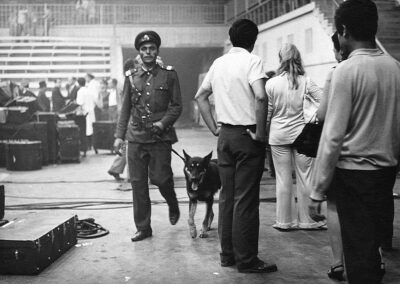
We cast a wide net around the world to locate this footage, contacting anyone and everyone who had a connection to National General or the film crew, as well as private archives, independent storage facilities and film labs. It was one dead end after another. It appeared that the footage and related elements had completely vanished.
And then, finally, success. While searching for the raw footage, we stumbled upon a pristine print of a 53-minute version of the documentary that had been edited for television syndication. This was an unexpected find as no such version was ever broadcast. A new high-definition transfer was made from this print and watching it provided a fascinating time capsule of our nation, the world, and this group of nine young men on an unprecedented adventure from 50 years earlier. I knew then we had the makings of a fantastic documentary and, indeed, 40 minutes of the “lost” Blood, Sweat & Tears documentary is the backbone of our film.
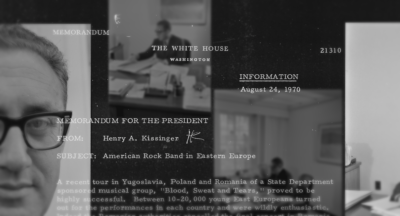
Some additional heavy digging led us to the Margaret Herrick Library at the Academy of Motion Picture Arts and Sciences, where we ultimately uncovered five raw audio tapes that were recorded live during concerts on the Iron Curtain Tour. The band had a mobile 8-track machine on the tour and we later determined that their engineer had recorded a total of 18 tapes, but only these five were found.
Our search into the private collections of band members and others who were on the Iron Curtain Tour yielded hundreds of never-before-seen photographs and memorabilia. I never gave up hope of finding the 65 hours of original footage. However, after two full years of chasing down every lead and digging deep into vaults across the country as well as government storage facilities in Washington, D.C., Maryland and Virginia, we came up empty. The mystery of what became of that material remains.
This film sheds light on history through a fascinating lens. It’s not a biography of the band, nor is it just for music lovers or fans of Blood, Sweat & Tears. It’s a compelling story that explores a unique moment in time and has surprisingly powerful resonance and parallels to what’s going on in the world today. ~ John Scheinfeld
The 2023 Laemmle Oscar Contest results are in.
It’s the day after Pi Day, but check out these cool pie charts to see who won our Umpteenth Annual Oscar Contest (the winner got 21 correct; the final question about the running time proved to be a tiebreaker between the second and third place winners, who both got 19 correct) and confirm that Laemmle moviegoers are crazy savvy about predicting how the Academy will vote. Of the 23 categories, the Laemmle hive mind accurately guessed all but four categories:
Best Supporting Actress (Jamie Lee Curtis/Everyone Everywhere All at Once bested Angela Bassett/Black Panther: Wakanda Forever);
Best Makeup & Hairstyling (The Whale swallowed Elvis);
Best Score (All Quiet on the Western Front defeated Babylon);
Farewell, Chaim Topol.
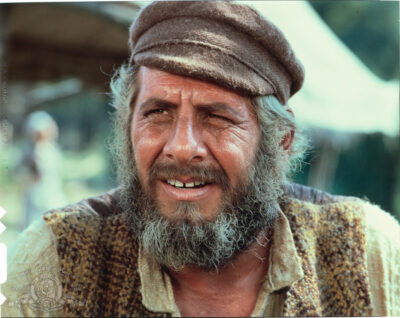
WHAT THE HELL HAPPENED TO BLOOD, SWEAT & TEARS? Q&A schedule.
What the Hell Happened to Blood, Sweat & Tears? Q&A schedule:
Friday, March 31st at 7:10pm & Saturday, April 1st at 7:10pm @ Laemmle Monica Film Center; five-time Grammy winner Jimmy Jam will moderate.
Monday, April 3rd at 7:00pm @ Laemmle Noho
Tuesday, April 4th @ Laemmle Claremont CANCELLED
Wednesday, April 5th at 7:00pm @ Laemmle Town Center; Steve Edwards, TV personality and three-time Honorary Mayor of Encino, will moderate
Thursday, April 6th @ 7:00pm @ Laemmle at Glendale
“A pity party that has no business being so much fun,” UNA VITA DIFFICLE opens in the U.S. after a 62 year wait.
The long-awaited U.S. premiere of Dino Risi’s Una Vita Difficile, starring one of the most beloved of all Italian actors, Alberto Sordi (Mafioso, Il Boom, Fellini’s The White Sheik and I Vitelloni, etc.), was greeted with big crowds and admiring reviews when Rialto Pictures opened its restoration in New York last month. Laemmle Theatres opens the film about a resistance fighter-turned-journalist and his wife (Lea Massari) navigating life in post-war Italy on Friday, March 17 at the Royal and Town Center and March 24 at the Monica Film Center and Laemmle Glendale.
The New York Times’ critic A.O. Scott hailed it as “a stellar specimen of commedia all’italiana.” In his review for Air Mail, Michael Sragow proclaimed, “Alberto Sordi triumphs at jet-black comedy…(he’s) Jack Lemmon and Walter Matthau in their prime, rolled into one.”
In Italy, Una Vita Difficile has long been cherished as a highlight of the 1950s and 60s golden age of Italian comedy, which also gave the world Big Deal on Madonna Street, Divorce Italian Style, Mafioso, Yesterday, Today and Tomorrow, and Risi’s own Il Sorpasso (made the year after Una Vita Difficile). While these and others were major arthouse hits in the U.S., Una Vita Difficile was inexplicably never released here…until now.

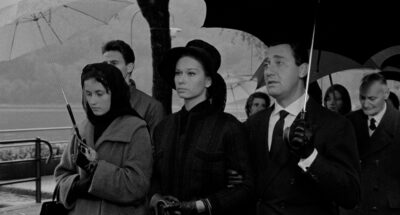
“It sounds absurd to even contemplate: an unreleased 1961 epic romance starring the legendary Alberto Sordi that tackles the decades after WWII — a mixture of sentiment and grand historic sweep that the Italians always did so well — that’s somehow just getting a U.S. release.” — Bilge Ebiri, New York Magazine
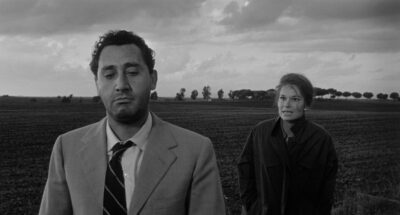
“Risi’s deft seriocomic panorama, from Mussolini’s fall to the rise of the postwar Roman oligarchy…Alberto Sordi triumphs at jet-black comedy when the antihero fails as an idealist, a husband, even as a sell-out. The closest America has come to Sordi is Jack Lemmon and Walter Matthau in their prime, rolled into one.” — Michael Sragow, Air Mail
- « Previous Page
- 1
- …
- 11
- 12
- 13
- 14
- 15
- …
- 73
- Next Page »
